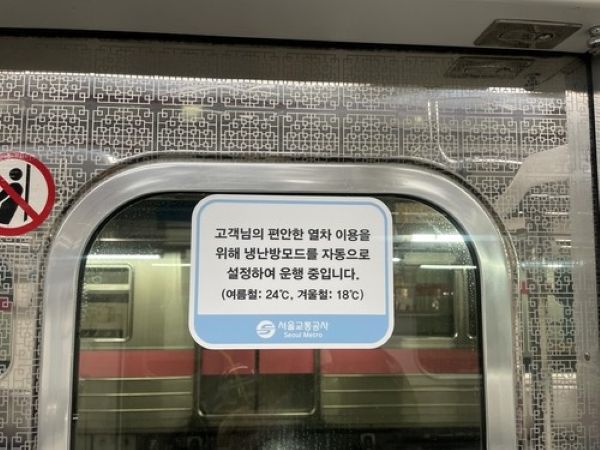SEOUL, Aug. 19 (Korea Bizwire) – As South Korea grapples with relentless summer heat, an unlikely battleground has emerged: the thermostat. In office buildings and on subways, debates over air-conditioning settings have intensified, exposing a deep divide in how people experience temperature — and how they express it.
Commuters trade complaints online, with some lamenting the chill of overzealous cooling while others bemoan stifling conditions on public transit. “It’s freezing on the subway — I’m shivering all the way,” one user wrote on Threads. Others express envy of co-workers stationed directly under ceiling vents. At the same time, some resort to wearing padded jackets indoors in August.
Subway Woes: 500,000 Complaints in Seven Months
The Seoul Metro is bearing the brunt of this seasonal discontent. According to data from Seoul Metro, 805,000 public complaints were registered between January and July — 80% of which were related to cooling and heating. Complaints more than doubled from March (40,000) to May (120,568), coinciding with rising temperatures.
Of the 505,148 air-conditioning-related complaints in that period, a striking 93% came from riders saying it was too hot — though paradoxically, many complaints arose simultaneously in the same car with others complaining it was too cold.
Messages from passengers ranged from humorous threats to stark frustration: “Is the driver the only one who needs to be cool?” read one. Another said, “If you don’t fix this, we’ll pull the emergency brake.”
In Offices, ‘Thermostat Wars’ Break Out
The drama is mirrored in offices, where so-called “AC wars” have become a seasonal tradition. Office workers trade subtle glares or passive-aggressive remarks over a single degree change in temperature.
Some attribute the conflict to hierarchy. Employees complain that managers dominate control over thermostats, often shutting off the air or opening windows regardless of others’ discomfort. In Japan, such behavior has even coined the term “air-hara” — short for “air conditioner harassment.”
Experts Cite Biological and Environmental Differences
According to medical experts, thermal comfort is not one-size-fits-all. Factors like age, sex, metabolism, and body fat significantly influence how temperatures are perceived. Women and older adults typically feel colder, while men, with higher metabolic rates, tend to prefer cooler temperatures.
“Even at the same temperature, people can feel it very differently,” said Dr. Kim Kyung-woo of Inje University Seoul Paik Hospital, warning that air conditioning settings should balance comfort and health.
Doctors also warn about “air-conditioning sickness” — a pseudo-diagnosis marked by headaches, muscle pain, and indigestion caused by rapid temperature changes between indoors and outdoors.
A Call for Moderation Amid Climate Crisis
Amid rising global temperatures, public discourse is shifting. Some argue for empathy toward those more sensitive to heat, while others question whether blasting AC until people need jackets is justifiable in a climate crisis.
The Korea Energy Agency recommends an indoor summer temperature of 26°C, a modest departure from the official 28°C guideline for public institutions. Some suggest incorporating fans and air circulators as a compromise to reduce over-reliance on heavy cooling.
“Air-conditioning sickness is a luxury illness,” one commenter quipped online. “If you’re worried about climate change while wrapped in a blanket in August, something isn’t adding up.”
As the mercury rises and tempers flare, South Korea’s thermostat wars highlight not only personal preferences but deeper questions about social etiquette, climate responsibility, and public health.
M. H. Lee (mhlee@koreabizwire.com)


